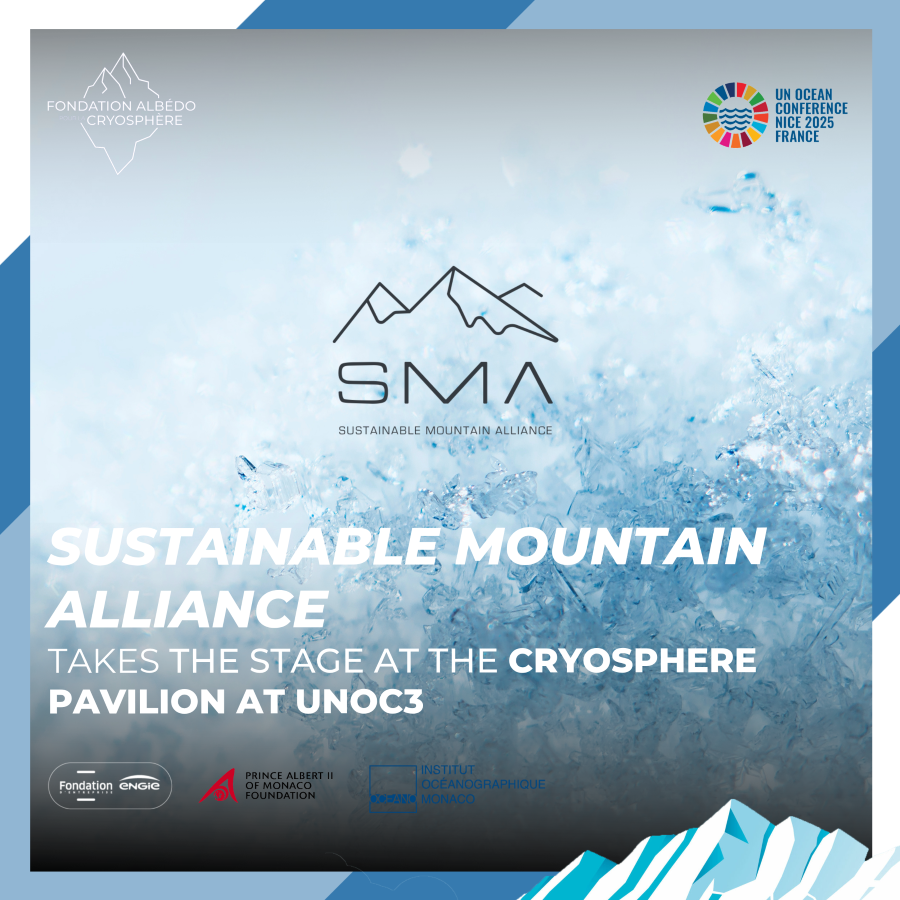Press Release – 11 June 2025, Nice, France.
From 9 to 13 June, Nice hosted the 3rd United Nations Ocean Conference, a pivotal moment for international cooperation on ocean sustainability. The event convened heads of state, policymakers, athletes, civil society and leading scientists from around the world, all united by a common objective: to assess the critical health of our oceans and to urge collective action to restore and protect marine ecosystems.
For the first time, the United Nations Ocean Conference featured a Cryosphere Pavilion, made possible through the support of the Albédo Foundation. This dedicated space highlighted the critical but often overlooked link between the world’s ice-covered regions and the health of our oceans. The cryosphere holds around 70% of the planet’s freshwater, much of it locked in glaciers. As ice caps and glaciers melt at accelerating rates, this freshwater is irreversibly lost to the ocean, altering marine salinity, disrupting ocean currents, and contributing to rising sea levels. The implications are far-reaching, threatening biodiversity, coastal communities, and global water security. The Pavilion, aligned with the International Year of the Glacier 2025, aimed to place these urgent issues at the forefront of climate and ocean discussions.
Clean water, clean sports: accelerating solutions for sustainable sport

Within the Cryosphere Pavilion, the SMA hosted a panel that discussed how partnerships are used to advance sustainability initiatives across the world of sport from the Summits to the Sea. Panellists included:
- Ingrid Beutler, Senior Partner, Think Beyond and Co-Founder of Sustainable Mountain Alliance
- Laura Cantounet, Protect Our Winters
- Pierre Germeau, Co-Founder of Sustainable Mountain Alliance & Sustainable Marine Alliance
- Rishi Jain, Director of Impact at Liverpool Football Club (LFC)
- Flora Artzner, Wingfoil World Champion and biodiversity engineer
This session provided a platform to showcase several startups supported by the Sustainable Mountain Alliance’s accelerator programme, and to explain the vision behind Accelerator, to identify and support sustainable and innovative solutions that facilitate the transition to sustainable sport and tourism in the mountains. The accelerator offers tailored mentorship, increased visibility and strategic support to early-stage enterprises. The panel also included a call for new startups and mentors to join the initiative, reinforcing the Alliance’s commitment to building a collaborative ecosystem for climate innovation.
Notably, this panel was one of the few at the conference to place sport at the heart of its narrative. Speakers explored how sport can serve as a powerful platform to drive awareness and action, given its global reach and emotional resonance. This potential was exemplified by Liverpool FC, who presented their comprehensive sustainability strategy, The Red Way. One of the most advanced programmes in the world of football, The Red Way illustrates how clubs can move beyond symbolic gestures and adopt meaningful, systemic approaches to environmental and social responsibility.
Bridging marine and alpine science and sport for a sustainable future

On the margins of the event, SMA President Anne-Cécile Turner met with Catherine Chabaud, French sailor and politician, Dr. Heidi Sevestre, SMA board member and glaciologist, and Mathieu Tordeur, explorer, writer and film producer. As an interconnected planet, the collaboration between the scientific and sporting worlds is crucial to ensure we are responsible stewards of the future. The role of citizen science, whereby sailors, explorers, alpinists, skiers and other adventure athletes contribute to scientific understanding of the world around us, especially in remote geographies, is just beginning. In offshore sailing, the use of scientific devices on race boats has contributed to understanding ocean and planetary health since 2012. Such data helps us adapt, mitigate, minimise our negative actions and responsibly prepare for the future.

